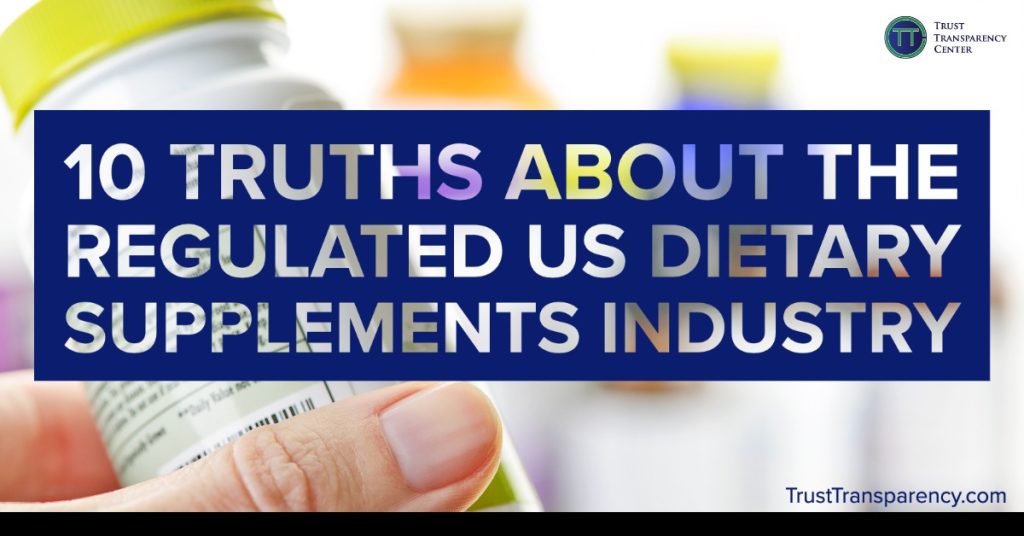I wrote this article a couple years ago, having reached that tipping point of frustration in two areas – hearing over and over that the US supplement industry was not regulated and realizing there was no easy, simple document (that I could find) that really directly answered the questions in short paragraphs, all in one place. This piece was designed for the lay person (or media), and I realize that the readers of this blog (presumably) know more than that. However, with more and more newcomers launching brands, and with the contract manufacturers they work through often not providing ample guidance and accountability, we figured that we’d re-post so that perhaps we and others could reference this piece as perhaps a primer for the uninitiated.
To many, the US dietary supplements market seems to be an unregulated Wild West. In fact, nothing could be further from the truth. Below are 10 ways the supplements industry is actually regulated.
- The US Food and Drug Administration (FDA) has oversight of food, drugs and supplements under the Food Drug and Cosmetic Act of 1938. FDA has the power to recall product or ingredient that it deems a safety threat or risk to public health, inspect facilities, take manufacturers to court, seize product upon import and many other actions to fulfill its obligations and responsibilities to US consumers.
- The US dietary supplements industry is regulated by DSHEA, the Dietary Supplements Health and Education Act, passed by Congress in 1994. This created a new regulatory environment for supplements, as a subset of foods. When detractors claim that the industry is unregulated, they usually mean that it is not regulated as drugs. This is true because supplements are NOT drugs — DSHEA is specific for supplements and gives loads of authority to FDA, as they themselves have claimed and proven.
- Dietary supplement manufacturing is also regulated. In 2007, FDA released its Good Manufacturing Practices rule for dietary supplements. This rule covers processes, operations, product quality and many other aspects of production, storage, handling and product quality. Since, that time, hundreds of facilities have been inspected each year, several on multiple occasions.
- We often hear of FDA and other bodies commenting that supplements are found to be adulterated with undeclared drugs, often in the classes of weight loss, sports performance and sexual enhancement products. This is an illegal activity and technically, these products are misbranded as supplements, that is, they are not even allowed at all to be presented as supplements if these ingredients are found to be in them. Frequently, mainstream media and other groups will claim this is a supplement industry issue, but again, these products cannot be classified as supplements to begin with. The same applies for products containing steroids. This adulteration was specifically covered first in the Anabolic Steroid act of 2004, and then subsequently in the Designer Anabolic Steroid Control Act of 2014 to cover new and emerging anabolic steroids masquerading as supplements.
- Many believe that there is no control over what claims a supplement company can make associated with its product. This is covered a couple of different ways. A supplement company is required to notify FDA of claims it intends to make within 30 days of that product entering commerce. If a company makes unsubstantiated or misleading claims, it is subject to FDA and/or FTC action.
- The US Federal Trade Commission (FTC) has responsibility for the handling of consumer protection in all goods categories. Specifically, all claims made must be substantiated (the company, when called upon, must be able to provide evidence of this), and all claims must be truthful and not misleading (open to incorrect interpretation or be confusing). FTC on its own initiative, or through consumer or market applications through various mechanisms can and does investigate egregious claims, taking companies to court and other actions to cause claims to be changed or eliminated, and in some cases, fines and redress are quite significant.
- Drug claims, that is claims that a dietary supplement product cures, mitigates or prevents disease are expressly prohibited and are illegal. Claims allowed under DSHA are called structure/function claims and generally use language such as ‘supports’ or ‘promotes’. FDA does have several approved health claims for all foods, including dietary supplements.
- Detractors say that there is no review for ingredient or product safety for dietary supplements. A truer statement is that there is no pre-market approval for dietary supplements, although there is a pre-market submission and review of new dietary ingredients required under law. This process, known as a New Dietary Ingredient (NDI) notification requires the company bringing the new ingredient to the market, once identifying it as new (if it is not new, it is presumed covered as a grandfathered ingredient under DSHEA, and in the market prior to 1994, and presumed safe) to submit a dossier to the FDA showing that it is safe. FDA ultimately responds to these notifications not with ‘approval’, but rather a ‘no objections’ statement and indication. This process is specific and is unique to the ingredient and process of the manufacturer. Another way to show ingredient safety that many companies use is to follow what is known as Generally Recognized as Safe (GRAS) affirmation as a food ingredient (or known in the food supply), a less rigorous and sometimes more expedient process. Both processes are intended to be prior to commercial availability of the ingredient, and both are dose specific.
- It is frequently claimed that no authority, especially the FDA, can get a product off the market, even if shown to present a health or safety risk. This is an untrue statement. A specific example is in the case of the ingredient ephedra, removed from the market when the FDA, in 2004, banned the sale of supplements containing ephedrine alkaloids. In another example, FDA issued a recall, in 2009, for 14 products associated with the brand Hydroxycut. This product was subsequently reformulated and reintroduced. Other risk presenting supplements have also been recalled under FDA orders.
- Most consumers believe that dietary supplements are safe and the data exists to generally illustrate this. Furthermore, in 2006, the Food, Drug and Cosmetic Act was amended to require supplement companies to report serious adverse events (SAERs) to the FDA within 15 days and to keep records of all non-serious events for a period of 6 years. This has provided, arguably for the first time, evidence that the category is safe, considering that over 70% of US consumers take some form of dietary supplement.
Bonus:
Under the Food Safety Modernization Act of 2011, FDA was granted broader powers to prevent food safety issues and many of the provisions of the Act have enhanced further the safety of production and distribution of dietary supplements. Recent applicable aspects which have come into effect include foreign inspections, and manufacturing operations having safety plans that include risk analysis for biological and environmental hazards, allergen controls, and supply/sourcing related hazards.
Summary:
It is an interesting exercise to examine and compare the pharma and supplement markets, operations and supply chains. However, as noted above, in the US, dietary supplements are presented as a subset of foods. But let’s go through a bit of the exercise…
By definition, dietary supplements are meant to supplement the diet and the source of the ingredient is clearly specified by DSHEA. Many originally are from food sources, or known in the food supply, although recently, we have seen the introduction of synthetic or biosynethetic ‘equivalents’. Many of these ingredients are therefore not patentable like drugs are. Furthermore, they are often new or previously not identified species, obtained to treat a disease. The protection offered by the patent process allows for a larger scientific investment, and proving safety on new species demands research on safety. Supplements certainly cannot be presented to treat disease, hence that lucrative, insurance supported marketplace is not available.
It is true that dietary supplements are not regulated as are drugs and this makes sense. Having been in both pharma and supplement operations in a few continents, though, I can attest to the fact that despite regulations, many supplement operations are operated to the exact or very similar standards as their pharma counterparts.
Where consumer groups, industry associations and even FDA regulators often agree is that enforcement of the regulations that currently exist is a challenge. With the Internet as a huge channel of sale, it is even more difficult for FDA to examine all companies operating in this marketplace. Most agree that additional enforcement resources would be welcome.
Note: this is an assessment of the US dietary supplements regulatory environment. Supplements are regulated differently in other countries.
Additional reference: http://cms.herbalgram.org/herbalgram/issue93/FEAT_myth.html?ts=1521826171&signature=3e6b2039fa68a3b538afe3fa01f81eb0






